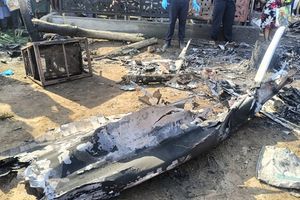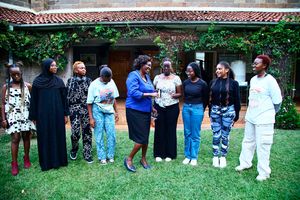Sudan launches mass disarmament campaign with bang in the desert

Guns and ammunition captured from armed groups in South Sudan.
What you need to know:
- Multiple civil wars have raged in Sudan on and off since independence in 1956.
- The Geneva-based Small Arms Survey, a research organisation, calculates there were 2.76 million illegally-held weapons in Sudan in 2017, or 6.6 guns for every 100 people.
Sudan's army launched a disarmament campaign Tuesday to seize all illegal weapons in a country left awash with guns after decades of civil war, by blowing up 300,000 firearms.
"Our country has suffered enough," said Lieutenant General Ibrahim Jaber Ibrahim, a member of the sovereign council, the highest body in the country, at a ceremony in the desert.
"We are going to take very strict measures to prevent the possession of weapons," Ibrahim said, speaking at the Hager al Assal base, some 200 kilometres (125 miles) north of the capital Khartoum.
"They must remain exclusively in the hands of regular forces."
Multiple civil wars have raged in Sudan on and off since independence in 1956, including the 1983-2005 war that led to the secession of the south, and the devastating conflict in the western region of Darfur that began in 2003.
The Geneva-based Small Arms Survey, a research organisation, calculates there were 2.76 million illegally-held weapons in Sudan in 2017, or 6.6 guns for every 100 people.
As well as Darfur in the west, ousted president Omar al-Bashir's Islamist regime fought rebel forces in the east and in the southern states of Blue Nile and Southern Kordofan.
The weapons destroyed Tuesday had been "voluntarily" handed in over the past three years, the army said.
"Now it is no longer on a voluntary basis," said Abdel Hadi Abdallah, the general heading the disarmament campaign. "It is mandatory to hand them over."
The disarmament campaign follows a ceasefire deal last month between Sudan's government -- which took over following Bashir's ouster in 2019 -- and rebel commanders from the Sudan Revolutionary Front (SRF) coalition.
The peace deal aims to end nearly two decades of conflict that have killed hundreds of thousands of people, particularly in Darfur.
Rebel fighters are to be slowly incorporated into joint units with government security forces.
One Western diplomat warned Tuesday it was "not certain that the armed groups will allow themselves to be disarmed".
Holdout rebels have also refused to take part in the deal.
One group, the Darfur-based Sudan Liberation Movement (SLM) faction led by Abdelwahid Nour, launched an attack on Monday, the army said.
Another, the South Kordofan-based wing of the Sudan People's Liberation Movement-North (SPLM-N) led by Abdelaziz al-Hilu, has signed a separate ceasefire.
That deal allows rebels to keep hold of their guns for "self-protection" until Sudan's constitution is changed to separate religion and government.





